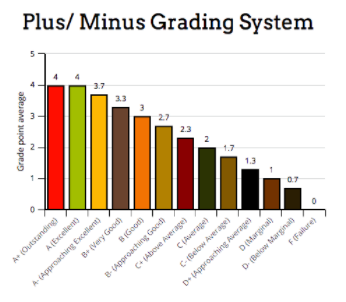The University’s recent adoption of a plus/minus grading system now makes it possible for students to see wider variations in their grade point averages.
The plus/minus system was initially implemented exclusively for graduate courses in the 2002-2003 academic year. UOG’s new plus/minus grading system is now acknowledged in the undergraduate catalog.
During the beginning of Fanuchanan/Fall 2016, UOG’s faculty raised concerns about the standard letter grading system, stating that there must be a change to ensure students are treated equally in terms of their grades.
The plus/minus system is broken down into the following (see chart below):

In other words, students who receive a 99% and others with a 91% should not be classified under the same “A.”
The significant problem students may encounter with the plus/ minus grading system, however, is the letter grade, C. The grade C- is weighted below a 2.0 and if program requirements call for a C grade or higher, a C- means students must retake the course.
UOG’s Senate Standing Committee on Evaluation conducted a survey in September 2016, directed towards the faculty which raised the question on whether or not utilizing the plus/minus grading system in undergraduate courses should be optional. Out of the 116 faculty who responded into the survey, 76 (66%) agreed, while 40 (34%) disagreed.
The professors who responded to the survey explained that implementing the new grading system is fair as it reflects variances in academic achievement. With the current grading system, the distance between letter grades makes it difficult to accurately reflect the student’s performance. On the other hand, the faculty that opposed the plus/ minus system argued that it is unclear and a waste of time to calculate an unnecessarily complex format.
As a result, the affirmative outweighed the negative and the implementation of the new system is provided optional by instructors. Programs are also given the option to utilize the new system or continue with the old.
Student Government Association (SGA) senator Evander DeGuzman said SGA has yet to have meetings concerning the grading system. “Whatever is implemented in the admin council is what we must comply with,” said DeGuzman. “This change is positive. It should motivate students to work harder to reach a higher grade.”
Yukiko Inoue- Smith, Ph.D., professor and chair of UOG’s 16th Faculty Senate, was one of the many individuals who had been pushing for the implementation of the new system. She has been working on implementing the plus/minus system for undergraduate students for many years.
Inoue-Smith analyzed her students if there were any negative impacts by comparing the new with the old grading system, but there was no drastic change. She stated that regardless of the change in system, at the end of the day, it all boils down to the performance and determination of the student.
Sharleen Santos- Bamba, Ph.D., associate dean of the College of Liberal Arts and Social Sciences, also said that fairness depends on the perception of the student and is the instructors job to notify their students if they have decided to implement the new system in their syllabus.
“The grades are earned,” Sharleen Santos- Bamba stated. “It is the student’s responsibility to ensure adequate academic progression and monitor their academic standing for themselves.”

